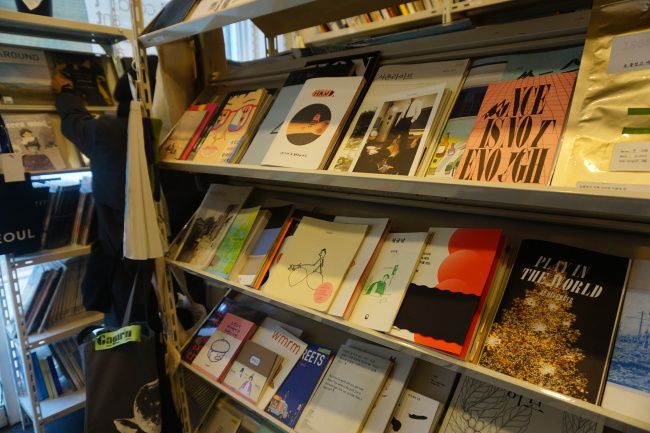Growth is conspicuously absent in Korea’s book industry, as evidenced by the number of bookstores closing down in Seoul.
Yet, a new type of publishing is on the rise, attracting readers, writers and sellers with rarely-written about topics, creative new designs and a niche approach.
Independent publishing, which covers both self-publishing and small, independent press, is a rare bright spot in the country’s moribund book industry, said Kim Kwang-chul, the owner of Propaganda Press, an independent publisher, who recently curated a special exhibition on independent publishing at the National Library of Korea.
Yet, a new type of publishing is on the rise, attracting readers, writers and sellers with rarely-written about topics, creative new designs and a niche approach.
Independent publishing, which covers both self-publishing and small, independent press, is a rare bright spot in the country’s moribund book industry, said Kim Kwang-chul, the owner of Propaganda Press, an independent publisher, who recently curated a special exhibition on independent publishing at the National Library of Korea.

A look at the overall book industry data illustrates this.
The number of registered publishers has grown to 42,000 from 16,000 in 2000, while the bookstores suffered a sharp decline ― in 1994, there were 5,683 bookshops in the country, but only 1,625 remain.
The rise of independent publishing is beneficial for the whole industry, injecting a breath of fresh air into the sector long dominated by mega publishing houses, said Seomun Hyung-chul, an official at the Ministry of Culture, Sports and Tourism.
“It is a sign of cultural diversity and people’s increasing interest in producing their own creative works,” he said.
The National Library exhibit, which runs until the end of March, is a timely event that sheds light on key characteristics of independent publishing, bringing together over 600 titles.
The subjects covered are seemingly limitless, ranging from design and photography to travel, although publishers tend to be artists or designers, it shows.
A fashion magazine with only plus-sized models “66100,” an A to Z on zombies “Zombie Dictionary,” and an essay “How to Sharpen Pencils” are some of the titles that saw the light of day thanks to independent publishers.
“It is neither market-oriented nor reader-oriented,” said Kim, the curator. “The books are published for the sake of the publishers as a means of expressing their own visions and goals,” he added.
Specializing in such unique, independently-published collections is Your Mind, a bookshop in the back alley of Hongdae, Seoul.
Opened in 2009, as the first independent bookstore in the neighborhood, Your Mind is a haven for those treasure-hunting for design magazines, artsy collectibles, indie books, stationery, and photographs not easily found in big bookstore chains.
“I learnt about this place from my professor,” said Shin Jin-ah, a 24-year-old design student copiously navigating through books at the shop. “(I am surprised that) there are so many creative people making their own unique books. I definitely want to come back for inspiration and enjoyment.”
The humble-sized bookstore is filled with visitors, usually in their 20s and 30s. Most of them learn about the place through SNS and the official website, which launched a year before the store opened, Iro, the shop’s owner explained.
“When I first started, more people bought the books through our website. But now, the percentage has drastically shifted toward offline sales,” he said.
He believes independent publishing brings something distinctive to the industry.
“I don’t really see independent publishing as an alternative or a real threat to the industry,” he said.
In the large pie of publishing, there are tiny crumbles and that’s where independent publishing comes in, he went on. “There are consumers who desire something peculiar, unique or different.”
Catering to the minority is their strength, and weakness, Iro said.
“It’s not a high-return business, nor does it entail high risk. So if you are satisfied with that nature, it’s an interesting industry to be in.”
For Helen Ku, who owns The Book Society, another bookstore specializing in independent publications and small press, the business is not just about selling books.
Her bookshop, tucked away on a side alley of Tongui-dong, gives such a workroom ambience that it has become a hideout for writers, artists and designers who often stop by and hang out for a while.
Ku wanted it to be like that ever since she opened it in 2010.
“A small but talkative store ― that is what we aim to be,” said Ku, who runs the store with her husband. “A bookstore is where people can meet up, so using that characteristic and developing on that, we thought we can create a place where people can exchange diverse ideas and knowledge.”
In alignment with the vision, she holds exhibitions, book launching events, discussion sessions, movie nights and other cultural events at her store throughout the year.
“On the Table” is one such event at The Book Society. Every month, different artists showcase their works on the wooden table in the corner of the bookstore.
In organizing such events, Ku hopes one thing: To position books as a medium of communication.
“Independent publishing is about carrying diverse voices,” she said. “That’s really important to us.”
Publishing a book is a great way to express oneself with words and photos, or both, whichever methods one finds comfortable, said one of the managers at Gagarin, a bookstore carrying used-books and independent books, located a short five-minute walk from The Book Society.
Many visitors are bound to leave the bookstore thinking, “Maybe, I too can publish a book.”
By Ahn Sung-mi (sahn@heraldcorp.com)
-
Articles by Korea Herald











![[Today’s K-pop] BTS pop-up event to come to Seoul](http://res.heraldm.com/phpwas/restmb_idxmake.php?idx=644&simg=/content/image/2024/04/17/20240417050734_0.jpg&u=)





![[KH Explains] Hyundai's full hybrid edge to pay off amid slow transition to pure EVs](http://res.heraldm.com/phpwas/restmb_idxmake.php?idx=652&simg=/content/image/2024/04/18/20240418050645_0.jpg&u=20240419100350)

![[Today’s K-pop] Zico drops snippet of collaboration with Jennie](http://res.heraldm.com/phpwas/restmb_idxmake.php?idx=642&simg=/content/image/2024/04/18/20240418050702_0.jpg&u=)